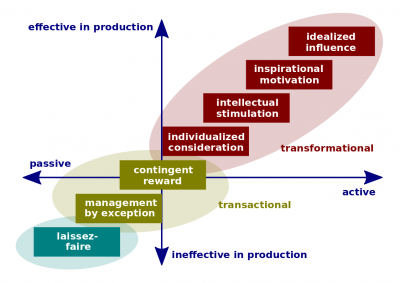Difference between revisions of "Management by exception"
(→Related coursework) |
|||
| Line 1: | Line 1: | ||
[[File:Leadership-styles.png|400px|thumb|right|[[Full Range Leadership Model]]]][[Management by exception]] (hereinafter, the ''Style'') is [[leadership style]] of someone who maintains the status quo and intervenes into lower level management only if financial and/or operational results substantially differ from the budgeted or expected figures. The leader who exercises the ''Style'' is considered being a type of [[transactional leader]]s. | [[File:Leadership-styles.png|400px|thumb|right|[[Full Range Leadership Model]]]][[Management by exception]] (hereinafter, the ''Style'') is [[leadership style]] of someone who maintains the status quo and intervenes into lower level management only if financial and/or operational results substantially differ from the budgeted or expected figures. The leader who exercises the ''Style'' is considered being a type of [[transactional leader]]s. | ||
| + | |||
| + | ==Definitions== | ||
| + | According to [[Managerial Accounting by Braun, Tietz (5th edition)]], | ||
| + | :[[Management by exception]]. A management technique in which managers only investigate budget variances that are relatively large. | ||
| Line 15: | Line 19: | ||
*[[Leadership Quarter]]. | *[[Leadership Quarter]]. | ||
| − | [[Category: Septem Artes Administrativi]][[Category: Articles]] | + | [[Category: Septem Artes Administrativi]][[Category: Articles]][[Category: Accounting]] |
Latest revision as of 11:57, 15 July 2020
Management by exception (hereinafter, the Style) is leadership style of someone who maintains the status quo and intervenes into lower level management only if financial and/or operational results substantially differ from the budgeted or expected figures. The leader who exercises the Style is considered being a type of transactional leaders.
Definitions
According to Managerial Accounting by Braun, Tietz (5th edition),
- Management by exception. A management technique in which managers only investigate budget variances that are relatively large.
Full Range Leadership Model
- Main wikipage: Full Range Leadership Model
Full Range Leadership Model. A model that depicts seven managerial leadership styles on a continuum: (1) laissez-faire, (2) management by exception, (3) contingent reward leadership, (4) individualized consideration, (5) intellectual stimulation, (6) inspirational motivation, and (7) idealized influence.
Transactional leadership
- Main wikipage: Transactional leadership
